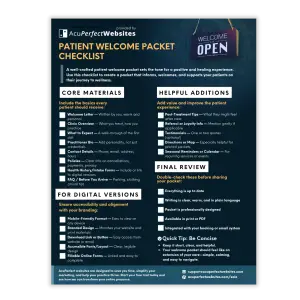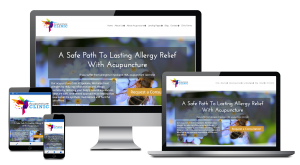If you’ve explored building or updating your acupuncture website recently, there’s a good chance you’ve encountered the suggestion to “just use ChatGPT.” It’s fast, easy, and often sounds professional enough. But there’s a growing problem practitioners need to be aware of: relying on ChatGPT, or any AI, for all your website content can quietly damage your search rankings, reduce trust with new patients, and create long-term issues for your online presence.
Let’s explore the hidden risks behind AI-only content, why it matters for local SEO, and what a better content strategy looks like for your practice.
Google’s Official Stance on AI-Generated Content
![]() Google has publicly addressed the use of AI in content creation. In their February 2023 update, they made it clear that content created using AI is not automatically against guidelines, but it must still meet Google’s standards for originality, usefulness, and clarity.
Google has publicly addressed the use of AI in content creation. In their February 2023 update, they made it clear that content created using AI is not automatically against guidelines, but it must still meet Google’s standards for originality, usefulness, and clarity.
“Using automation, including AI, to generate content with the primary purpose of manipulating ranking in search results is a violation of our spam policies.” – Google Search Central Blog
This creates a gray area. AI content isn’t banned, but the emphasis is on quality and intent. If the content was created purely to fill space or mimic expertise, it likely won’t perform well. That’s a problem when AI is used to write entire websites without oversight.
This is also where Google’s Helpful Content System comes in. It’s a search update designed to reward “people-first” content. The algorithm looks for writing that’s genuinely helpful, personal, and experience-based. It quietly downranks content that feels mass-produced, vague, or robotic — traits that many AI-written pages carry.
Understanding EEAT: What Google Looks For in Healthcare Content
 Google uses a framework called EEAT to evaluate content quality. It stands for:
Google uses a framework called EEAT to evaluate content quality. It stands for:
- Experience
- Expertise
- Authoritativeness
- Trustworthiness
This matters even more for medical topics, which are part of what Google classifies as “Your Money or Your Life” (YMYL) content. In short, the stakes are high if the information is inaccurate.
AI tools can simulate expertise with clinical-sounding explanations, but they lack firsthand experience. They can’t talk about your training, your patient success stories, or your hands-on approach. Without that layer of human voice and proof of expertise, your site could underperform in rankings even if everything “sounds good.”
The Problem with AI-Generated Content That Lacks Originality
 One of the biggest concerns with using ChatGPT for your website is that it produces content based on patterns and common phrasing pulled from its training data — not your personal experience or your clinic’s identity.
One of the biggest concerns with using ChatGPT for your website is that it produces content based on patterns and common phrasing pulled from its training data — not your personal experience or your clinic’s identity.
AI can string together paragraphs that sound clean and professional, but the result often feels generic. Without your voice, your perspective, or your story, that content fails to differentiate your website from others. It doesn’t speak to your ideal patient or reflect what makes your approach unique.
For example, if your services page says,
“Acupuncture is an ancient Chinese practice that uses thin needles to restore balance,”
you’ve said something that’s true, but also something that appears on thousands of other websites.
What patients actually want is to understand how you use acupuncture. What kind of conditions do you specialize in? What philosophy guides your treatments? What can a new patient expect during their first visit?
That’s the gap AI can’t fill. It can’t talk about your years of experience helping people with migraines, your clinic’s calm energy, or your work with local pregnancy groups. When your content is built only from AI, those details get left out — and that’s what separates you from every other acupuncturist in town.
Search engines notice this too. Google doesn’t just want informative content. It wants content that’s written by real people with real experience. That’s what builds authority, trust, and visibility in your local search results.
How AI-Only Content Hurts Local SEO
 For acupuncturists, most new patients come from local search. That means your website’s visibility in your geographic area — not just your overall ranking — is what drives appointment requests. Google prioritizes businesses that appear genuinely rooted in a community, and your content plays a big role in how your practice is ranked locally.
For acupuncturists, most new patients come from local search. That means your website’s visibility in your geographic area — not just your overall ranking — is what drives appointment requests. Google prioritizes businesses that appear genuinely rooted in a community, and your content plays a big role in how your practice is ranked locally.
AI-generated content struggles with this in several key ways.
1. Lack of Local Context and Relevance
ChatGPT doesn’t inherently know your city, neighborhood, or the people who live there. If you don’t intentionally feed it detailed local prompts, it can’t reflect what matters to your community. Even then, the tone and phrasing often feel disconnected or artificial.
This matters more than you might think. Local SEO depends heavily on content that signals geographic relevance. Without these signals, your website is less likely to show up when someone searches for:
- “acupuncture near me”
- “cupping in downtown Asheville”
- “fertility acupuncture San Luis Obispo”
Your content needs to include these location-based terms naturally — not stuffed in as keywords, but written in a way that’s authentic and conversational. AI tends to produce generic pages that leave those nuances out entirely.
2. Missing Local Trust Signals
Google wants to recommend practitioners that real people trust in real communities. That’s why it rewards content that includes personal experience, testimonials, practitioner stories, and community involvement.
AI can’t mention the nearby co-op where you host workshops or the yoga studio that refers patients to you. It won’t include the patient questions you hear most often or the reasons people in your area seek acupuncture. These details send strong trust signals — not just to patients, but to search engines.
When these elements are missing, your site feels disconnected from the place it’s supposed to serve.
3. Inconsistent Messaging Across Online Platforms
Strong local SEO isn’t just about your website. It’s also about how well your website content aligns with your Google Business Profile, online directories, and other digital mentions. If AI writes your pages in a tone or structure that doesn’t match how you show up elsewhere online, that inconsistency can hurt your credibility.
For example, if your service descriptions sound stiff and clinical on your website but your GBP profile is friendly and personal, that disconnect can confuse both Google and patients.
4. Weak Engagement Signals
Local SEO is also influenced by how people interact with your site.
- Do they stay on your pages?
- Do they click through to read more?
- Do they fill out a form or schedule a consultation?
AI-written content, especially if it’s bland or too formal, doesn’t give visitors a reason to keep reading. When people bounce off quickly or don’t engage, Google interprets that as a sign your site isn’t helpful and that can lower your ranking.
In short, AI-only content misses what makes your clinic local. It skips the language, details, and tone that help your site show up in your neighborhood and connect with nearby patients. The result: lower visibility, fewer clicks, and lost opportunities to grow your practice.
Where the Human Voice Gets Lost
 A big reason people choose acupuncture is because of you. Your energy, your philosophy, and how you make them feel safe and seen.
A big reason people choose acupuncture is because of you. Your energy, your philosophy, and how you make them feel safe and seen.
That personal voice doesn’t come through when every page reads like a textbook. But that’s often the tone of AI-written content, especially when it’s left unedited.
When your blog posts and service pages are all built from AI prompts, they often:
- Lack emotional tone or warmth
- Repeat the same structure as thousands of other pages
- Miss opportunities to speak directly to your patients’ concerns
You might be surprised at how often patients notice this. They might not say, “this looks AI-generated,” but they’ll feel something is off. It’s disconnected. Cold. Lacking care. In healthcare, that’s not a good first impression.
The Compliance and Security Risks
 Some practitioners mistakenly believe they can use AI tools like ChatGPT to help write treatment summaries or handle internal documentation. That opens up another risk: HIPAA and GDPR compliance.
Some practitioners mistakenly believe they can use AI tools like ChatGPT to help write treatment summaries or handle internal documentation. That opens up another risk: HIPAA and GDPR compliance.
Any content or patient data input into a public AI tool is not secure. It can be stored, reused, or potentially exposed in future outputs.
Even beyond PHI, uploading practice documents, business strategies, or private messaging into AI platforms can create a vulnerability. For your website content, the risk is more reputational. If Google or a competitor flags your site as having weak or copied content, it’s hard to recover.
Where AI Can Still Be Useful
 This isn’t an anti-AI article. Tools like ChatGPT are helpful when used wisely, as part of your toolkit — not as your entire content team.
This isn’t an anti-AI article. Tools like ChatGPT are helpful when used wisely, as part of your toolkit — not as your entire content team.
Here’s where it can help:
Outlining blog posts or pages before writing
- Brainstorming ideas or headline variations
- Summarizing technical research or studies for reference
- Helping with translations or phrasing adjustments
But every AI-assisted draft should be edited, personalized, and fact-checked. That’s where working with a content expert, or using a service that understands acupuncture and SEO, makes all the difference.
Why a Hybrid or Human-First Approach Works Best
Let’s compare how different approaches affect your SEO and online credibility:
|
Content Strategy
|
SEO Strength
|
Patient Trust
|
Local Relevance
|
Google Compliance
|
|---|---|---|---|---|
|
ChatGPT Only |
Low |
Low |
Weak |
Risky |
|
AI + Human Editing |
Medium |
Medium |
Inconsistent |
Moderate |
|
Professional Content |
High |
High |
Strong |
Compliant |
When you use AI to support your process but rely on professional oversight for strategy, tone, and accuracy, you get the best of both worlds. You save time, avoid SEO penalties, and still sound like you.
Editorial Standards Matter Especially in Healthcare
 Healthcare websites are held to a higher standard. If your acupuncture website says something inaccurate or misleading, even by accident, it can damage trust or misguide a patient.
Healthcare websites are held to a higher standard. If your acupuncture website says something inaccurate or misleading, even by accident, it can damage trust or misguide a patient.
That’s why editorial quality matters. A single misphrased sentence about fertility acupuncture or herbal contraindications could create doubt or worse, liability.
Good healthcare content is:
- Accurate and up-to-date
- Written in a tone that aligns with your philosophy
- Structured for both patients and search engines
- Edited for clarity and flow
This is where many AI-only websites fall short.
Final Thoughts: Trust Can’t Be Automated
 Search engines may be powered by algorithms, but what they reward is human connection. And that’s the part AI can’t manufacture.
Search engines may be powered by algorithms, but what they reward is human connection. And that’s the part AI can’t manufacture.
When someone visits your website, they’re not just looking for a list of services. They’re deciding whether to trust you with their health. They want to feel reassured by your tone, informed by your experience, and seen in your approach. AI-generated content, no matter how polished, can’t replicate the empathy, depth, or credibility that comes from your real-world voice and perspective.
That’s the core problem with relying entirely on tools like ChatGPT. You may save time up front, but you risk losing the very qualities that convert website visitors into loyal patients — trust, personality, and authority.
Content that sounds too perfect, too polished, or too vague doesn’t feel personal. And in healthcare, people are seeking a human connection before anything else. If your content reads like it could belong to anyone, it fails to show why someone should choose you.
The goal of your acupuncture website is not just to show up on Google. It’s to connect, convert, and establish your role as the go-to acupuncturist in your area. That requires content with intention, local relevance, and a personal tone. That’s something no AI can replicate — and something your patients will absolutely notice.
If you’re ready to create content that truly represents your practice and builds trust with both Google and your community, let’s talk.
At AcuPerfect Websites we’ve been building websites since 2011. We help acupuncturists show up online the same way they show up in practice with professionalism, warmth, and clinical depth. We don’t automate your credibility. We build it.
If you want an acupuncture website that reflects your voice, builds patient confidence, and meets Google’s evolving standards, let’s work together.
Download Our Free Patient Welcome Packet Checklist
 Your first impression can make all the difference in whether a new patient returns. This free Patient Welcome Packet Checklist helps you create or improve your welcome materials so they build trust, set clear expectations, and encourage long-term care. Download it now to make sure your packet supports retention—without missing any important details.
Your first impression can make all the difference in whether a new patient returns. This free Patient Welcome Packet Checklist helps you create or improve your welcome materials so they build trust, set clear expectations, and encourage long-term care. Download it now to make sure your packet supports retention—without missing any important details.
Contact us today if you’re ready to take your website to the next level. At AcuPerfect Websites we can help you establish an online presence that amplifies your new patient efforts.
Get Professional Support
Let us help you grow your practice and become the go-to acupuncturist in your community. Our mission is to help new patients find your practice.
Next Step and Taking Action
 Ready to see the difference a human-written, professionally designed website can make?
Ready to see the difference a human-written, professionally designed website can make?
Start with a free, no-obligation trial of AcuPerfect Websites. We’ll show you how your content can sound more like you, help you rank better in search, and attract the right patients—without the stress of starting from scratch.
Try us free and experience what it’s like to have a website that truly reflects your practice. Let’s make sure your first impression leads to lasting impact.
Get Professional Support
AcuPerfect Websites has been building acupuncture websites since 2011, and we know exactly what works. Our sites are designed with SEO best practices, easy navigation, and conversion-focused layouts—ensuring that your practice ranks well and attracts new patients.
We can help you grow your practice and become the go-to acupuncturist in your community.
Give your practice the refresh it deserves! Let’s get started!

Need a high quality website for your practice?
AcuPerfect Websites offers website plans for all budgets. Our websites rank well in search results and our features can help save you time and money, accelerate your patient attraction and enable you to manage your practice easier.
We’d be grateful to join you on your practice journey by helping you attract new patients to your practice, so you can do what you love, treat more patients.


